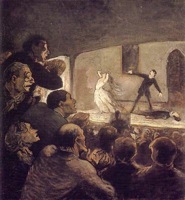Melodrama
Etymology
modification of French mélodrame, from Greek melos song + French drame drama, from Late Latin drama
- Date: 1802
Definitions
- 1 a : a work (as a movie or play) characterized by extravagant theatricality and by the predominance of plot and physical action over characterization
- b : the genre of dramatic literature constituted by such works
- 2 : something resembling a melodrama especially in having a sensational or theatrical quality
Description
The theatrical genre of melodrama uses theme-music to manipulate the spectator's emotional response and to denote character types. The term combines "melody" (from the Greek "melōidía", meaning "song") and "drama" (Classical Greek: δράμα, dráma; meaning "action"). While the use of music is nearly ubiquitous in modern film, in most cases it is used within a fairly rigid structure. In a melodrama the characterizations will accordingly be somewhat more one-dimensional: heroes will be unambiguously good and their entrance will be heralded by heroic-sounding trumpets and martial music; villains will be unambiguously bad, and their entrance will be greeted with dark-sounding, ominous chords.
Melodramas tend to be formulaic productions, with a clearly constructed world of connotations: A villain poses a threat, the hero escapes the threat and/or rescues the heroine. The term is sometimes used loosely to refer to plays, films or situations in which action or emotion is exaggerated and simplified for effect. As against tragedy, melodrama can have a happy ending, but this is not always the case.
